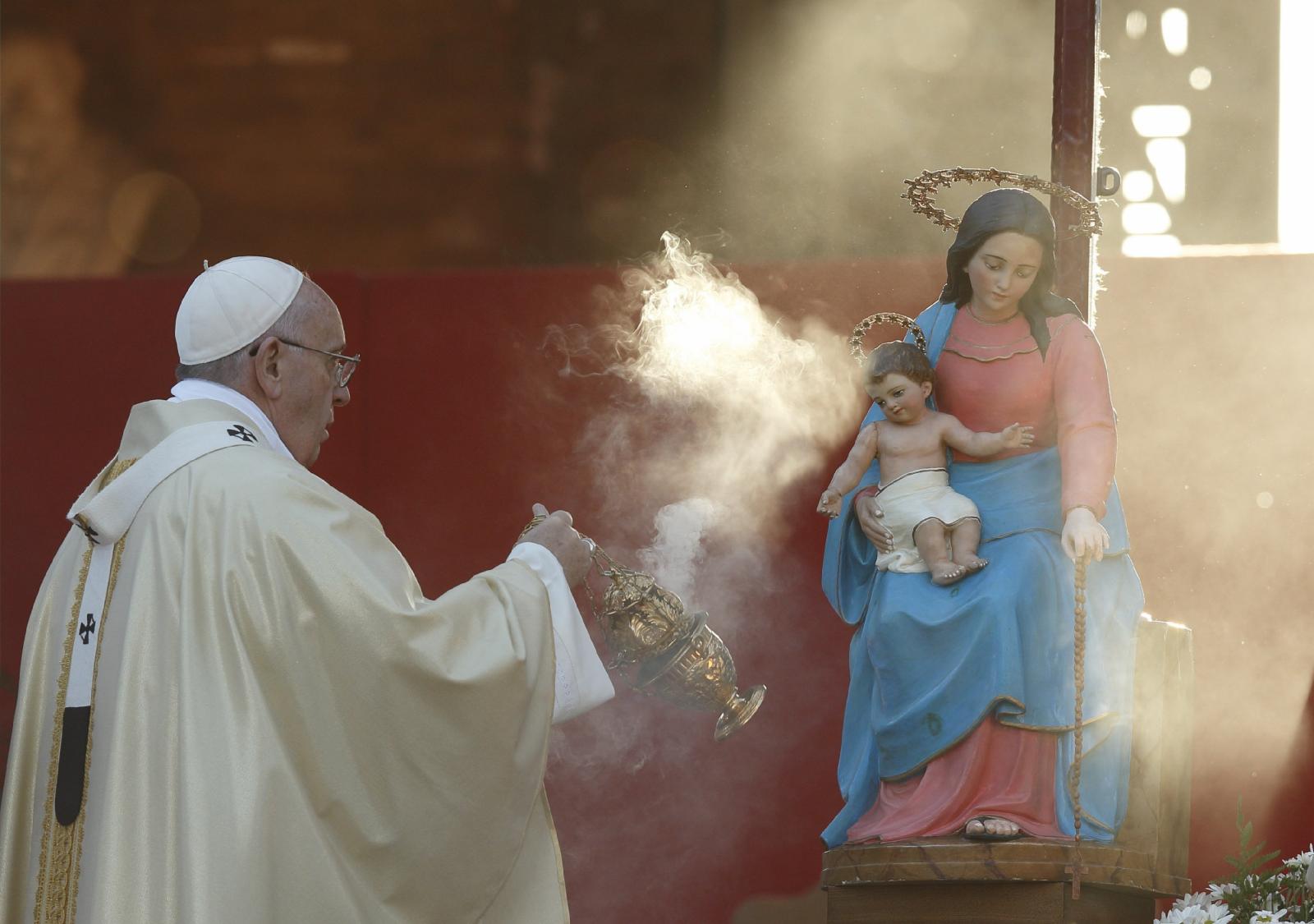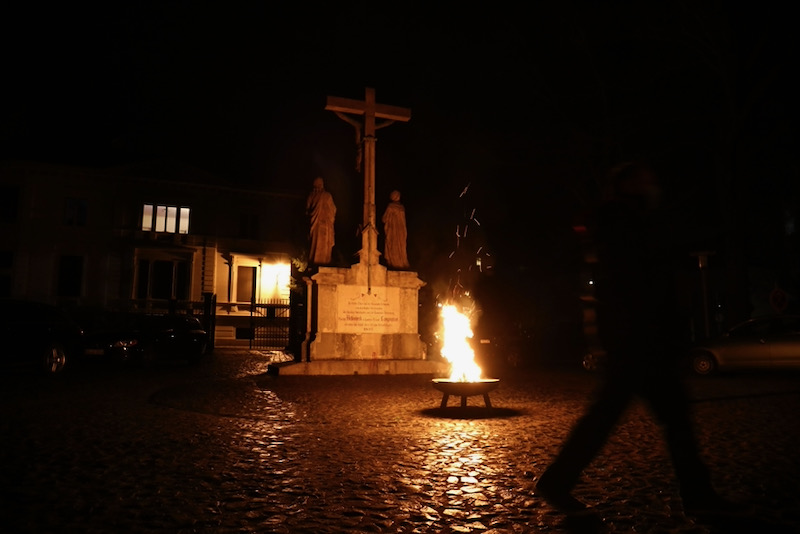The high cost of the Vatican’s ruling against same-sex blessings has been laid out in stark terms by the Bishop of Antwerp. During a discussion with The Tablet, Bishop Johan Bonny explained that in his diocese large numbers of young people had cancelled their baptismal registrations because of the ruling. Across the traditionally Catholic heartlands of Belgium’s Flemish dioceses, he believed the number who have disaffiliated from the Church stands at around 2,000. Similar findings are likely to be found in other places.
So what might be done to retrieve the flock who are leaving? During the 28 April webinar hosted by The Tablet, Bishop Bonny and a panel of theologians explored how the Church could include and recognise same-sex couples and LGBT Catholics. Yet this question goes deeper than whether or not it is possible to bless gay unions. Instead, it raises profoundly important ecclesiological issues including how to live the “Catholicity” of the Church differently.
Three areas of discussion are emerging as crucial to the debate.
First, is the process the church adopts when making decisions on contentious topics. It is now crucial for time and space to be given for discernment rather than Rome panicking and issuing premature judgements. This is where synodality, which Pope Francis wants to see at every level of the Church, comes in.
Some voices argue that synodal processes such as the one in Germany will result in “schism” because it will lead local churches into divergent stances on questions of sexuality or that challenge official teaching. But Bishop Bonny, who once worked at the Vatican’s Pontifical Council for Promoting Christian Unity, pointed out the threat to unity is in the other direction.
“You cannot have real unity or communion unless local churches can find the best solutions for their problems,” he said during the webinar. “There are basic lines, that’s clear, but for so many questions like ministry in the Church or moral theology, we need more differentiated solutions since the questions are not the same.”
On same-sex blessings, Bonny said there would have been “a different outcome” if Rome had invited bishops from a group of countries where gay marriage is the law to “sit together and make a common proposal”.
He went on: “We could have gone to Rome to discuss [the matter] with the Pope, not with all the cardinals, but the Pope himself, to find the best way possible, according to the Gospel, and what Jesus is teaching us, in the general interests of the Church and the Salus Animarum [good of souls]…That would be real collegiality.”
This requires a different role for Rome and a reimagined relationship between the papacy and local churches. Just issuing a repetition of old formulas to complex pastoral questions is inadequate. The Congregation for the Doctrine of the Faith's document, which said same-sex blessings are impossible because “God cannot bless sin”, was issued without consultation with bishops or the relevant Vatican departments.
By contrast, Amoris Laetitia, the Pope’s family life teaching, emerged after two synod gatherings on the family. Synodality offers ways for a discerned judgment to be reached. Rather than issuing condemnations, Amoris Laetitia focussed on accompaniment, integration and discernment and the positive elements in so-called "irregular" relationships. Fr James Alison, another of the webinar panellists, sees this as the magisterium of the Church walking alongside people. The learning process, he said, happens “sideways” and through “dialogue”. He explained: “It is sideways that we learn who we are. It is from and who each other.”
The second area is how Catholic teaching on homosexuality could be updated. Fr Alison, who is openly gay, argued that the stumbling block on the Church's ministry to LGBT Catholics remains the definition in the Catechism that same-sex orientation “is objectively disordered” and that homosexual acts are “intrinsically disordered”.
He added: “Until someone lets them off having to treat us as a negative definition from the heterosexual act, we are never going to move on. That is at the root of this.” A proposed amendment to the catechism could be to change the phrase “objectively disordered” to “differently ordered”, something which Jesuit priest Fr James Martin has called for.
Bishop Bonny pointed out that the catechism can be updated, adding: “I think there are paragraphs that in a very reasonable, collegial way could be changed for the good of the Church and for the pastoral work we have to do.”
Moral theologian Professor Lisa Sowle Cahill, another panellist, argued that change is more likely to come from the “bottom-up” in the Church, and less from top-down changes.
“I think it’s a mistake to keep trying to work out the reality of same-sex couples or gay and lesbian people within this older terminology which is so concerned with tying everyone down into very careful definitions so that we know exactly where to put everyone and how to set boundaries around them,” she said.
“The Catholic Church never changes its teaching by rejecting or revising what is from the past. Instead, we allow it to die a decent death.”
Professor Cahill, who teaches at Boston College, Massachusetts, said the Pope was offering a Gospel-based morality of “care, compassion and closeness” which should be at the centre of decision making. Amoris Laetitia, she points out, draws from the teaching of St Thomas Aquinas on the application of the natural law and the way it takes into account different factors even in “what is objectively true and right.” Professor Cahill pointed out that Amoris Laetitia states that even couples in “irregular” situations are not deprived of “sanctifying grace”.
The third area is which model of the Church people are using. Bishop Bonny says he likes to see the Church as a family seeing his role as a father or grandfather. It is his responsibility, he said, to make LGBT Catholics “feel part of the family that is the church, not only by welcoming them, but also by giving them a responsibility.” He also recommended that bishops take the time to meet with same-sex couples in their homes.
“Invite your bishop for an evening meal at home and talk with him. It will be a conversion for him”, he advised gay Catholics.
“Once I was invited by two women in a civil marriage with two children, that evening changed my ideas about what it means to live together as a homosexual couple, even having children. I can have many questions, but it changed my ideas.”
If the Church is a family, then it cannot adopt the characteristics of a sect. Sects tend to see themselves as a club and are willing to exclude or throw out people who don’t conform. If the Church is a family then it will always be distressing to hear of people leaving.
Sr Gemma Simmonds of the Margaret Beaufort Institute in Cambridge said the Church cannot operate a system of “you don’t have a ticket” so you are not welcome.
“We are losing people, we are bleeding people…who find that the reality in which they live no longer finds a response within the church of acceptance and blessing,” she said. She offered 1 John 4:16 as encouragement for same-sex couples: “God is love, and anyone who lives in love lives in God, and God lives in them.”
The Vatican’s doctrine office may have thought that issuing a ruling against same-sex blessings would be enough to close down further discussion about the topic. In fact, it has had the opposite effect, only sparking more debate which go to the heart of what it means to be the Church.



 Loading ...
Loading ...